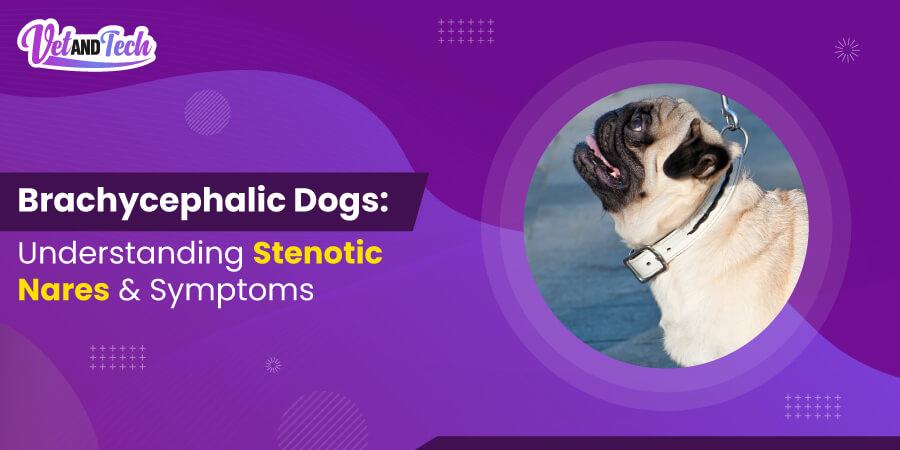Brachycephalic Dogs: Stenotic Nares, Symptoms and More!
Brachycephalic dog breeds such as bulldogs, pugs, and French bulldogs are among the most popular and cherished pets in the United States. However, many pet owners are unaware that these charming companions can suffer from serious health conditions that can affect their quality of life.
Stenotic nares are one such abnormality. This disease in brachycephalic dogs causes the canines' nostrils to narrow or collapse inward, making it difficult for the pet patients to breathe.
In this blog, we’ll discuss this condition in more detail, highlighting its causes, symptoms, treatment options, and more.
Overview of Stenotic Nares
This is a genetic disorder caused by the malformation of alar folds or cartilage in a dog’s nose. This condition typically leads to Brachycephalic Airway Obstruction Syndrome (BAOS), a pathological condition that can lead to serious respiratory issues.
|
Fact: Studies show that the likelihood of brachycephalic syndrome in dogs is more than 40%, making it one of the most common canine diseases. |
Congenital nasal stenosis, being one of the factors of BAOS, results in increased efforts to breathe in, which can adversely affect the larynx.
This condition needs to be treated effectively, or else it can collapse the larynx and lead to death.
Signs and Symptoms of Stenotic Nares
The symptoms of this brachycephalic airway syndrome in dogs depend on the severity of the condition. This list is often divided into different categories based on the nature of signs.
Below are listed the most common symptoms:
Respiratory Symptoms of Stenotic Nares
These signs are related to the overall function of the lungs and respiratory system. Congenital nasal stenosis can disrupt the respiration process, leading to the following issues:
- Reverse Snorting: Also known as paroxysmal respiration, reverse snorting occurs when a dog breaths in rapidly, causing loud snorting sounds.
- Difficulty Breathing: Dogs sitting or standing with mouths open often signal their inability to breathe normally. In addition, dogs suffering from difficulty breathing should avoid lying down on their sides.
- Labored Breathing: This is also known as dyspnea, a condition where dogs can’t breathe normally. Labored breathing leads to abdomen heaves, open-mouth breathing, and noisy breathing.
Other Symptoms
Apart from respiratory symptoms, dogs might also suffer from other symptoms caused by stenotic nares. For example, in some cases, the canines might experience a blood discharge from their nose due to irritation or inflammation in the nasal passages.
In addition, difficulty breathing can disrupt sleep, making the dog restless, agitated, or unable to settle comfortably at night.
How to Care for Dogs with Stenotic Nares?
Dogs with congenital nasal stenosis need special care. It’s important to consider the following factors when dealing with these canines:
- Weight Management: Maintaining an ideal weight is crucial for dogs with stenotic nares. Excess weight can put additional strain on the respiratory system and worsen breathing difficulties.
- Cool Environment: Providing a cool and well-ventilated environment is important, especially during hot weather, as brachycephalic dogs with this condition struggle to regulate their body temperature.
- Limited Exercise: For dogs with severe breathing difficulties, exercise might need to be limited or adjusted to avoid overexertion. Short walks in cool weather are a good option.
Learn About Stenotic Nares from Industry Experts!
DVM Central (an animal health marketplace), a Vet and Tech company, is hosting a grand virtual expo on August 15th, 2024!
Register yourself for free to learn more Stenotic nares in dogs.
The expert speaker, Bryden J. Stanley (BVMS, MANZCVS, MS, MRCVS, DACVS) will cover 2 important topics:
Topic 1: Assessment of Upper Airway Problems in Brachycephalics
Topic 2: Procedures for Airway Problems in Brachycephalic Breeds
Don’t miss out on this opportunity to enhance your knowledge base with industry experts. You can ask questions and inquire about different problems to get expert answers.
What’s more?
Joining DVM Central Expo -August Edition will earn you FREE CE credits! This webinar will not only equip you with the advanced treatment techniques of congenital nasal stenosis but also help veterinary professionals boost their professional profile with CE credits.
This webinar is RACE-approved, highlighting its credibility and adherence to international veterinary standards.
Register yourself today to join us at DVM Central Expo - August Edition!
In Short
Stenotic nares in dogs are a serious disorder that can lead to serious health conditions and even death (in severe cases). This condition can be identified by difficulty breathing, labored breathing, and other symptoms discussed above.
It’s important to discuss a pet patient's situation with an expert and board-certified vet to diagnose and treat the condition effectively.
Join Vet and Tech to learn and excel in your career. We conduct veterinary CE webinars regularly on a wide range of topics, helping veterinary professionals enhance their knowledge and skills. If you're passionate about sharing your expertise, explore how to become a speaker on Vet and Tech and contribute to the community.
FAQs
Do stenotic nares get worse with age?
Yes, this condition can worsen over time. It can decrease the lungs’ capacity and make it harder for the dogs to breathe. This can ultimately lead to low quality of life and even death (in the worst-case scenario).
What is the name of the surgery for stenotic nares?
The surgery to treat this brachycephalic airway syndrome is called rhinotomy. It’s the procedure in which veterinarians cut skin on the side of the nose to widen the area, giving access to the nasal cavity and other target areas for treatment.
How much does stenotic nares surgery cost?
The cost of congenital nasal stenosis surgery depends on multiple factors, i.e., location, experience/expertise of the veterinarian, and severity of the condition. However, the cost typically falls within the range of $500 to $2,000








